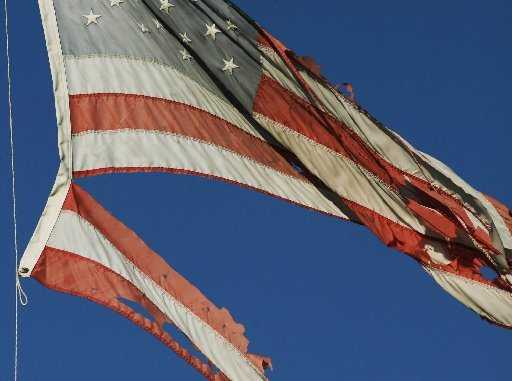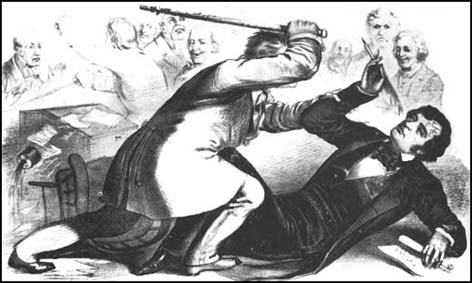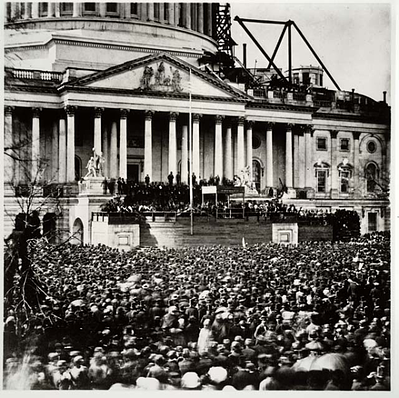 Many of us are today well aware of the angry clash of vision which holds our government in deadlock between proponents of the two major political parties and ideologies. Conservatives and Liberals are more divided by staunch partisan hatred than at almost any time in our nation’s history. It is well to remember, that the last time tensions rose to these heights we embarked on a Civil war which devastated our country and claimed over six hundred thousand American lives.
Many of us are today well aware of the angry clash of vision which holds our government in deadlock between proponents of the two major political parties and ideologies. Conservatives and Liberals are more divided by staunch partisan hatred than at almost any time in our nation’s history. It is well to remember, that the last time tensions rose to these heights we embarked on a Civil war which devastated our country and claimed over six hundred thousand American lives.
Today is an auspicious day on which to reflect upon this situation, as it was on this day, in 1856, that partisan wrangling in Washington caused an incident in the Senate that remains one of the darkest days in that bodies history.
 In 1856, in the rancorous period following the passing of the divisive Kansas-Nebraska Act and the subsequent carnage that erupted in Kansas, Senator Charles Sumner, an ardent abolitionist from Massachusetts rose in the Senate chamber and delivered a two day speech attacking that Act in no uncertain terms and blaming two key Senators in particular - Steven Douglas of Illinois and Andrew Butler of South Carolina. A couple of days later, a relative of Butler, Congressman Preston Brooks, of South Carolina, entered the Senate and proceeded to savagely beat the helpless Sumner ( who was seated defenselessly at a Senate desk which was bolted to the floor) into an unconscious, bleeding ruin. It took three years for Sumner to recover from the attack. (http://en.wikipedia.org/wiki/Charles_Sumner)
In 1856, in the rancorous period following the passing of the divisive Kansas-Nebraska Act and the subsequent carnage that erupted in Kansas, Senator Charles Sumner, an ardent abolitionist from Massachusetts rose in the Senate chamber and delivered a two day speech attacking that Act in no uncertain terms and blaming two key Senators in particular - Steven Douglas of Illinois and Andrew Butler of South Carolina. A couple of days later, a relative of Butler, Congressman Preston Brooks, of South Carolina, entered the Senate and proceeded to savagely beat the helpless Sumner ( who was seated defenselessly at a Senate desk which was bolted to the floor) into an unconscious, bleeding ruin. It took three years for Sumner to recover from the attack. (http://en.wikipedia.org/wiki/Charles_Sumner)
Obviously, we have not yet reached that kind of heated level in Washington, or at least not yet. But, do we want to? In our great country’s history we have risen to greatness most often when we have put aside differences and worked together for the good of the Nation itself.
In those dark days prior to war, Abraham Lincoln closed his first Inaugural address with these words:
“ We are not enemies, but friends. We must not be enemies. Though passion may have strained it must not break our bonds of affection. The mystic chords of memory, stretching from every battlefield and patriot grave to every living heart and hearthstone all over this broad land, will yet swell the chorus of the Union, when again touched, as surely they will be, by the better angels of our nature.”
And no one knew it better than he. His political idol in younger days had been the great Senator from Kentucky, Henry Clay. Clay was known as “the great compromiser” for his role in the passing of both The Missouri Compromise and the Compromise of 1850.
Shelby Foote, the wonderful historian featured so prominently in the Ken Burns documentary on the Civil War, observed that compromise is the great genius of this “American experiment”. And so it is.
Without compromise, this great “country without a king” would never survive. It is well that we remember Lincoln’s words, and try to proceed as though we are all friends.
 This is a portion of the message we try to promote with children when we perform our Living Abe Lincoln school assembly. We believe it is a good message, and central to the belief of the great man himself. We believe it is as timely today as it was when one man beat another senseless in the Senate all those years ago.
This is a portion of the message we try to promote with children when we perform our Living Abe Lincoln school assembly. We believe it is a good message, and central to the belief of the great man himself. We believe it is as timely today as it was when one man beat another senseless in the Senate all those years ago.






